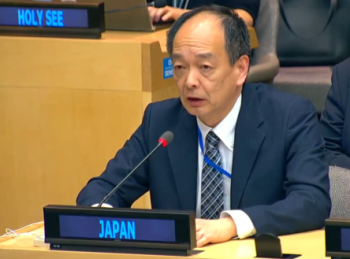Statement by H.E. Ambassador YAMANAKA Osamu, Deputy Permanent Representative of Japan to the United Nations, at the General Debate of the 2024 ECOSOC Humanitarian Affairs Segment
2024/6/25

(as delivered)
Mr. Chair,
I’d like to start by thanking Mr. Chair for convening this year’s Humanitarian Affairs Segment.
First, it is fitting that this segment began with a panel on international humanitarian law (IHL), as the erosion of respect for IHL is alarming, with civilians bearing the brunt of its consequences. This disturbing trend demands urgent action to foster a culture of IHL compliance. Japan calls on all parties to uphold IHL and ensure full, safe, rapid and unhindered access to mitigate humanitarian impacts and protect humanitarian personnel in places such as Gaza, Sudan, Ukraine, and Myanmar, to name just a few.
Mr. Chair,
Japan is committed to not only providing comprehensive humanitarian assistance but also emphasizing inclusive and sustainable solutions. Our policy is grounded in human security, which places importance on ensuring protection and empowerment for all, particularly the most vulnerable, in a comprehensive manner.
Against this backdrop, Japan’s approach to humanitarian crises integrates the HDP Nexus. By combining humanitarian relief with long-term development and peacebuilding, we address the root causes of crises. This holistic approach ensures our interventions are proactive in preventing future conflicts and disasters, thereby also contributing to reducing future humanitarian funding needs.
Mr. Chair,
Japan also devotes its efforts to the active participation of women. Empowering women from the perspective of WPS enhances their resilience and leadership, making them key agents of change in humanitarian responses and achieving sustainable peace. Recognizing their disproportionate impact in mitigating crises as well, Japan invests in women's education, healthcare, and economic opportunities through its ODA.
Climate change significantly aggravates humanitarian emergencies. At COP28 last year, Japan announced a 10 million US dollars contribution for commencing the operationalization of the fund for responding to loss and damage, aiming to assist developing countries that are particularly vulnerable to the adverse effects of climate change.
Japan will continue leveraging its disaster risk reduction experience to provide global support for mitigating the adverse effects of climate change on human mobility through various measures such as early warning systems and community resilience strengthening.
As humanitarian crises around the world worsen, the funding gap has reached an unsustainable level. It is more important than ever for UN agencies to seek effectiveness and innovation, as well as partnerships with emerging donor countries, international financial institutions, and the private sector, to reduce this gap. In Japan, with the increasing awareness of the importance of the SDGs and current humanitarian crises, the private sector has become more active in contributing to humanitarian activities. The Japanese company, Uniqlo, for example, has supported refugees and other forcibly displaced people by providing opportunities for skill trainings and also providing disaster recovery assistance across the world.
Mr. Chair,
I would also like to emphasize that addressing the plight of displaced persons is a critical focus of Japan’s policy. With the forcible displacement of more than 120 million people as of May of this year, marking the 12th straight year of increase and a doubling in the last decade, Japan, in both the public and private sectors, remains committed to promoting durable solutions to restore dignity and hope to displaced individuals. This commitment is a continuation of our role as a co-convenor of last year’s second Global Refugee Forum.
Let us work together to realize the swift resolution of the many humanitarian crises around the world.
Thank you.
